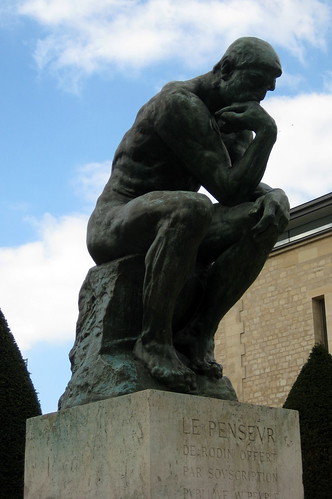If you look at the four gospels, you’ll notice that each of them has an account of John the Baptist baptizing Jesus as a central turning point in their accounts. Mark starts his gospel out with this event without any prelude or lead up.
If you read the other three gospels until that point, you get a mini-version of what is to come. John’s prelude is other worldly in many ways: The light shines in the darkness and the darkness did not overcome it. (John 1:5 NRSV) Matthew spends a lot of time fixing Jesus firmly within the Jewish tradition yet with an eye to speaking the gospel outside which are evidenced by his immediate listing of Jesus’ genealogy back to Abraham through David as well as the visit to the young savior Jesus by three mysterious, outsider Magi. You know, as you read through Matthew, that he’s going to return to those themes of Jesus’ Jewishness and the spreading of the gospel outside.
But Luke, if you read his prologue, gives a very different story and is the only one to include the accounts we heard this morning of women, particularly of Mary and Elizabeth’s reunion and the extraordinary song that Mary sings as she comes to fully understand what is really going on. Only Luke puts an emphasis on the women, silencing Elizabeth’s husband, Zachariah, and he keeps Joseph waiting in the wings for a few more verses. Only Luke recounts Mary’s incredible song that is at once intensely personal as well as political to the extreme. You know Luke’s gospel is going to be filled with good things.
Thus it is good for us to stop on this final Sunday before we reach Christmas and ponder with Mary and Elizabeth just what is happening. This fourth Sunday in Advent when we’re almost but not quite there. This final time of worship before the attention is all on a baby in a box of straw. We stop for a breath in the frenetic pace that leads up to the 25th of December and listen to Elizabeth and Mary, almost touching heaven but remaining firmly planted here on earth.
First we have Elizabeth, surprised by her own pregnancy with a child who would grow up to be John the Baptist. Both she and fetus John know something is up as soon as they hear Mary’s voice. They don’t even have to see her; her voice is sufficient for them to start rejoicing about the approach, the advent if you will, of Mary and the particularly special treasure she is carrying. With John leaping in the womb, Elizabeth has little choice but to greet Mary with words usually reserved for royalty and those who will bear royalty, which of course is what is going on.
We’re not told why Mary decides to pay a visit to her kinswoman, Elizabeth, but something has drawn her there, perhaps inevitably; perhaps Mary herself doesn’t even know why she’s there. Mary has already had her encounter with the angel Gabriel and is full of the knowledge that she’s been asked to perform a special duty and, more so, has accepted that duty. Within, she knows, she is carrying one who is going to change all of history. She knows this as only a mother can know it.
And that leads us to the second part of our scripture from Luke. There, safe with Elizabeth, unfettered by having to act a certain way or do certain things as she would have to do back in Nazareth, she sings her heart out; singing as only an expectant mother can do about how her child is going to change everything and will turn the status quo upside down.
Dietrich Bonhoeffer writes about this singing that Mary does:
This song of Mary is the oldest Advent hymn. It is at once the most passionate, the wildest, and one might even say, the most revolutionary Advent hymn ever sung. This is not the gentle, tender, dreamy Mary whom we sometimes see in paintings; this is the passionate, surrendered, proud, enthusiastic Mary who speaks out here. This song has none of the sweet, nostalgic, or even playful tones of some of our Christmas carols. It is, instead, a hard, strong, inexorable song about collapsing thrones and humbled lords of this world, about the power and God and the powerlessness of humankind. These are the tones of the women prophets of the Old Testament that now come to life in Mary’s mouth. (The Mystery of Holy Night, p. 6)
And so, before we charge headlong into this event we call Christmas, before we stop in a chilly stable beneath a starry sky, before we sing the carols that we have sung for ages, we stop and consider the words that burst forth from a young, pregnant woman’s lips over two thousand years ago. We consider how she saw the topsy-turvy world into which her child would be born and how he would bring into being his own topsy-turvy world and we realize that the song is song as strongly today as it ever has been. The powerful still need to be brought down from their thrones and the lowly should be uplifted. There are hungry ones in our midst who need their fill of good things while the proud could indeed use some scattering.
Mary’s song, sung out in safety in Elizabeth’s home echoes and echoes through the ages to us today. It’s message is not diminished, indeed, if you listen closely enough, you will hear it just before you perceive the beating of angels’ wings.


















